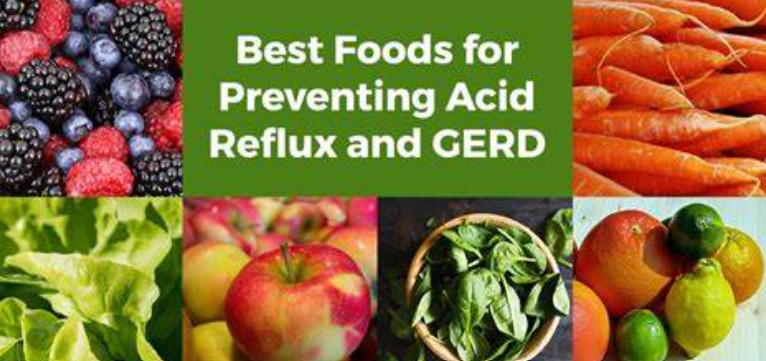
Acid reflux : 7 Best Foods to Relieve Acid Reflux Naturally
Acid reflux, also known as gastroesophageal reflux disease (GERD), is a common condition that occurs when stomach acid flows back into the esophagus, causing symptoms like heartburn, regurgitation, chest pain, and difficulty swallowing. While there are medications that can help alleviate these symptoms, many people prefer to manage their acid reflux through dietary changes and lifestyle adjustments.
The good news is that certain foods can help soothe the discomfort associated with acid reflux and promote better digestion. By choosing the right foods, you can reduce the frequency and severity of acid reflux episodes. Here are seven foods that are known for their ability to calm acid reflux and support overall digestive health.
1. Oatmeal
Oatmeal is an excellent food choice for anyone suffering from acid reflux. It’s not only easy to digest but also acts as a natural buffer for stomach acid. Oats are rich in soluble fiber, which absorbs excess stomach acid and helps keep it from flowing back into the esophagus. This fiber content can also aid in improving overall digestion, preventing constipation, and reducing bloating, which can sometimes exacerbate acid reflux symptoms.
Additionally, oatmeal is a versatile food that can be enjoyed as a breakfast or snack. You can top it with bananas (another acid reflux-friendly food), or add a drizzle of honey for extra soothing benefits. Be cautious with instant oatmeal, however, as it may contain added sugars or artificial flavorings that could irritate the stomach. Opting for whole oats is a healthier choice.
2. Ginger
Ginger has long been used in traditional medicine for its anti-inflammatory and digestive properties. It is particularly effective at soothing nausea and reducing inflammation in the digestive tract, making it an excellent option for those suffering from acid reflux. Ginger helps to promote the production of saliva, which can neutralize stomach acid and keep it from irritating the esophagus.
You can incorporate ginger into your diet in various forms, including fresh ginger tea, ginger capsules, or even grated ginger added to meals or smoothies. Drinking a warm cup of ginger tea after meals can help ease discomfort and prevent acid reflux flare-ups. Just be cautious with ginger in large quantities, as it may cause heartburn in some people when consumed excessively.
3. Bananas
Bananas are a top choice for anyone with acid reflux due to their low acidity and ability to coat the stomach lining. This protective layer can prevent stomach acid from making contact with the esophagus, reducing irritation and the burning sensation that often accompanies acid reflux. Additionally, bananas are high in potassium, a mineral that can help neutralize stomach acids.
Bananas are also easy to digest and are a great option for a quick, healthy snack or a breakfast addition. They can be eaten on their own or paired with oatmeal for a comforting, acid reflux-friendly meal. Just be sure to avoid overripe bananas, as they may be higher in sugar and potentially more acidic.
4. Green Vegetables
Green vegetables, such as spinach, kale, broccoli, and cucumbers, are rich in fiber, vitamins, and minerals, making them excellent choices for anyone looking to manage acid reflux. These vegetables are low in fat and acidity, which can help minimize stomach acid production and prevent it from rising into the esophagus.
Additionally, the high fiber content in green vegetables aids digestion and helps prevent constipation, which can sometimes trigger acid reflux symptoms. They are also rich in antioxidants, which can help reduce inflammation in the digestive system and promote overall health. These vegetables can be easily incorporated into salads, soups, or smoothies.
5. Aloe Vera
Aloe vera is widely known for its soothing properties, particularly when it comes to digestive issues. It has anti-inflammatory effects that can help calm the lining of the esophagus and stomach, reducing irritation caused by acid reflux. Aloe vera juice has been used for centuries to treat various gastrointestinal problems, including heartburn and indigestion.
To benefit from aloe vera, you can drink small amounts of aloe vera juice (without added sugar) before meals to help reduce symptoms. However, it’s important to use pure aloe vera juice, as many commercial aloe products contain additives that may worsen reflux. Be mindful of how much you consume, as aloe vera in large amounts can sometimes act as a laxative.
6. Lean Proteins
Consuming lean proteins, such as chicken, turkey, and fish, can help manage acid reflux symptoms by preventing the stomach from producing excess acid. Fatty foods, especially fried and greasy items, can trigger acid reflux and worsen symptoms. Lean proteins, on the other hand, are easy to digest and less likely to cause stomach discomfort.
In addition to chicken and turkey, fish such as salmon and trout are great options because they contain healthy fats, including omega-3 fatty acids, which are known for their anti-inflammatory properties. These proteins can be grilled, baked, or poached for a heartburn-friendly meal. Avoiding red meats and fried foods is crucial for managing acid reflux effectively.
7. Whole Grains
Whole grains, such as brown rice, quinoa, and whole-wheat bread, are excellent sources of fiber, which plays an important role in managing acid reflux. Fiber helps absorb stomach acids and can prevent them from entering the esophagus. Whole grains are also beneficial for overall digestive health, helping to regulate bowel movements and reduce the risk of constipation.
Incorporating whole grains into your meals can also keep you feeling full for longer, which may reduce the temptation to overeat—a common trigger for acid reflux. Whole grains can be easily added to salads, stir-fries, or served as side dishes with lean proteins and vegetables.
Conclusion
Managing acid reflux doesn’t have to mean avoiding all your favorite foods. By incorporating these seven foods into your diet, you can naturally reduce acid reflux symptoms and improve your digestive health. Oatmeal, ginger, bananas, green vegetables, aloe vera, lean proteins, and whole grains all work together to soothe the stomach, reduce inflammation, and keep acid reflux at bay.
Remember that lifestyle changes, such as eating smaller meals, avoiding lying down after eating, and managing stress, can further help reduce acid reflux flare-ups. Always consult with a healthcare professional before making significant changes to your diet, especially if you have a chronic condition like acid reflux.







